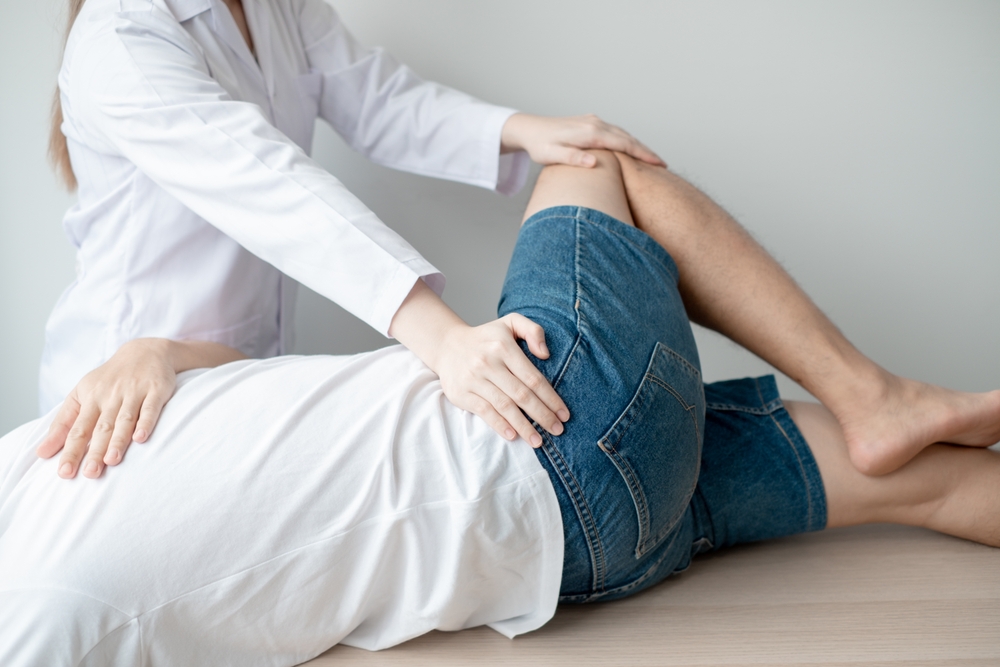If you’ve ever felt a sharp, nagging pain on the outside of your hip, especially after running, biking, or even just walking uphill, you might be dealing with something called IT band hip pain. It’s a common complaint amongst athletes and active individuals, but the good news is, there’s a lot you can do to relieve and prevent it.
What Is the IT Band and How Does It Affect the Hip?
The iliotibial band (IT band) is a long, thick band of connective tissue that runs along the outside of your thigh. Starting at your hip, all the way down to your shinbone (tibia). Think of it like a stretchy, supportive strap that helps stabilize your leg as you move.
The IT band works closely with the muscles of your hip and thigh to keep your knee and pelvis aligned. But when it becomes tight, irritated, or inflamed, it can rub against the bony structures near your hip and knee. This can lead to pain, stiffness, and discomfort.
When the irritation happens near the top of the band (closer to the hip), it’s commonly referred to as IT band hip pain or proximal IT band syndrome.
Common Causes of IT Band Hip Pain
IT band hip pain often develops from overuse, but a few key factors can increase your chances of experiencing this painful condition:
- Repetitive activities like running, cycling, hiking, or walking long distances
- Poor biomechanics, such as overpronation, leg length differences, or weak core/hip muscles
- Sudden increases in activity level or intensity
- Improper footwear or unsupportive surfaces
- Tight hip or thigh muscles pulling on the IT band
Over time, these stresses cause the IT band to tighten and become inflamed, leading to a burning or aching sensation on the outer hip.
Signs and Symptoms to Watch For
Wondering if your pain could be IT band-related? Here are some common red flags:
- A sharp or aching pain on the outer side of the hip, especially with movement
- Discomfort that worsens with activity, particularly running or climbing stairs
- Tenderness when pressing on the outer hip or thigh
- A feeling of snapping or popping near the hip joint
- Pain that may radiate down the thigh, but usually doesn’t extend past the knee
It’s important not to ignore these symptoms. Left untreated, IT band issues can worsen and start affecting your movement patterns, leading to more widespread pain and compensation injuries.
Who’s Most at Risk for IT Band Issues?
While IT band hip pain can affect anyone, some people are more prone to developing it:
- Runners and cyclists, especially those training at high volumes or increasing mileage quickly
- Dancers and athletes who perform repetitive leg motions
- Office workers who sit for long hours with poor posture, leading to tight hip flexors and glutes
- Individuals with muscle imbalances, weak hips, or poor core strength
- Women, due to differences in hip anatomy that place more tension on the IT band
If you fall into one of these categories and are experiencing outer hip pain, it’s worth getting checked out early, before it becomes a bigger problem.
How Physical Therapy Can Help
At Rock Valley Physical Therapy, we go deeper than just treating your IT band hip pain. We get to the root of what’s causing it.
Our licensed physical therapists start with a comprehensive movement assessment to identify any muscle imbalances, joint restrictions, or movement patterns that are contributing to the issue. From there, we develop a personalized treatment plan that may include:
- Hands-on manual therapy to reduce muscle tightness and improve tissue mobility
- Targeted strengthening exercises, especially for the glutes, hips, and core
- Stretching and foam rolling techniques to release tension in the IT band and surrounding muscles
- Postural training and movement retraining to correct mechanics
- Dry needling (if appropriate) to address deep muscle tightness and trigger points

Our goal is to not only get you out of pain but to help you move better, prevent re-injury, and return to the activities you love. And remember, you don’t need a referral to start physical therapy with us. We make it easy to get care right when you need it.
Effective At-Home Treatments to Support Recovery
While we always recommend a professional evaluation for persistent pain, there are a few things you can try at home to ease mild IT band hip discomfort:
Foam Rolling
Gently roll along the outer thigh and hip to release tension in the IT band and surrounding muscles. Be cautious, too much pressure can increase irritation, so start slowly.
Hip Stretches
Focus on stretching the glutes, hip flexors, and outer thigh muscles. Try a figure-four stretch, pigeon pose, or side-lying IT band stretch.
Strengthening Exercise
Glute bridges, clamshells, and side leg lifts can help build the hip stability needed to reduce IT band strain.
Ice Therapy
Applying ice to the outer hip can help reduce inflammation, especially after activity.
Activity Modification
Temporarily reduce high-impact activities like running or hill climbing to give the tissues time to calm down.
These strategies can help manage early symptoms, but if the pain sticks around for more than a week or two, it’s time to get a pro involved.
When to Seek Professional Help
If your IT band hip pain is:
- Not improving with rest or self-care
- Getting in the way of your workouts or daily activities
- Causing you to limp, favor one side, or adjust your posture
- Accompanied by swelling, numbness, or weakness
…then it’s time to reach out to a physical therapist.
At Rock Valley Physical Therapy, our team is trained to pinpoint the exact cause of your pain and build a recovery plan that works for you. Whether you’re an athlete, a weekend warrior, or someone who just wants to move without discomfort, we’re here to help you find lasting relief.
No referral is needed, and we have over 60 convenient locations with flexible hours to fit your schedule. Let us help you take the first step toward feeling better.
Don’t let hip pain hold you back. Schedule your evaluation today with Rock Valley Physical Therapy, and get moving again, pain-free.
